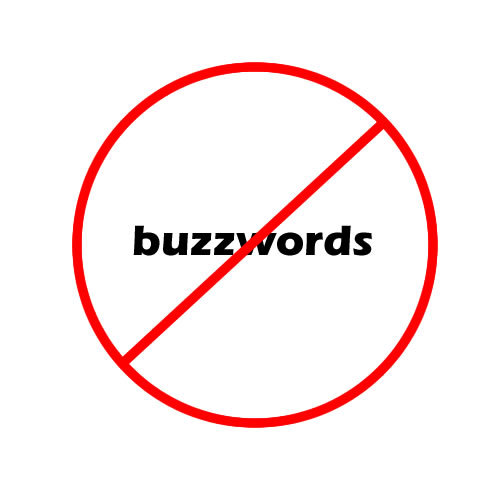The Problem with Buzzwords

We read a lot of web pages (while sourcing candidates), and we read a lot of resumes. We have noticed more and more the homogenization and commoditization of language – company web pages are looking more and more like each other, and so are resumes. It is getting harder to get through the corporate jargon to differentiate what makes a company or a person different. The excessive use of buzzwords – words and phrases all too commonly used by companies and people to sound more polished, more erudite, more businesslike – sometimes obscures the true value proposition. Experts often advise companies and job seekers to include buzzword language, so that Search Engine Optimization improves, causing your company to appear higher on Google results, or in the case of resumes, so that electronic scanning by employers selects you to be interviewed.
What do we mean by excessive use of buzzwords? This may be an exaggeration of course, but maybe your company’s web page describes you as something like a Global Solutions Provider Leveraging Core Competencies to Establish a Competitive Advantage, Optimize Deliverables, Create a Vertical Market Paradigm Shift and Ensure Customer Delight. If your description focuses on generalities, how can anyone tell you apart from your competitors? Fewer companies are being direct, and just describing what they make or what they do.
Resumes are even worse offenders on the use of buzzwords. Resume books, online guides and professional resume writers may suggest to you that you seed your resume with words and phrases that will be better appreciated by the people potentially reading your resume. There are actually websites that give you pre-selected buzzwords to include on your resume that are geared for the industry segment and position you are seeking.
However, although you might be “uniquely qualified” for the role, everyone claims that. Everyone is also claiming to be a “self-starter” that is “driven to results”. Hopefully you are not a “seasoned professional”. Resumes often have a whole page of platitudes that are completely interchangeable from one resume to the next. Just because you start a line with an action word (Implemented, Developed, Spearheaded, Formulated, Assessed) doesn’t make what comes next meaningful. And, some things are a given. If you are an experienced executive we take for granted that you create strategic plans, manage budgets, supervise people, negotiate deals, etc., etc.
As “seasoned” resume readers, we just roll our eyes, and skip to the first indication of your career, the reverse chronological listing of your job titles and companies. We hope that you will at least put your bulleted accomplishments within the context of each job, but many resumes now bundle these in groups of competencies that further obscures their meaning. Then, we don’t know what you did where, or when you did it. The info becomes less useful.
Companies and job seekers both could be more direct. Companies: please describe your products and services, your mission, your history, your applications, industries served, etc. in an easy to find manner. Candidates: please just tell us what is valuable to know about you in real terms.
Buzzwords make you look the same as everyone else. The only way to establish your value proposition is through differentiation: What makes you truly unique, special, different or better than the competition? That will cause customers and employers to sit up and take notice.
























